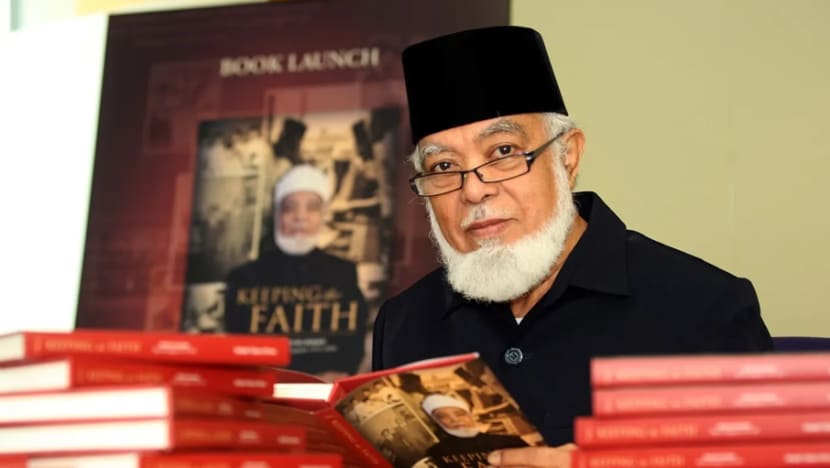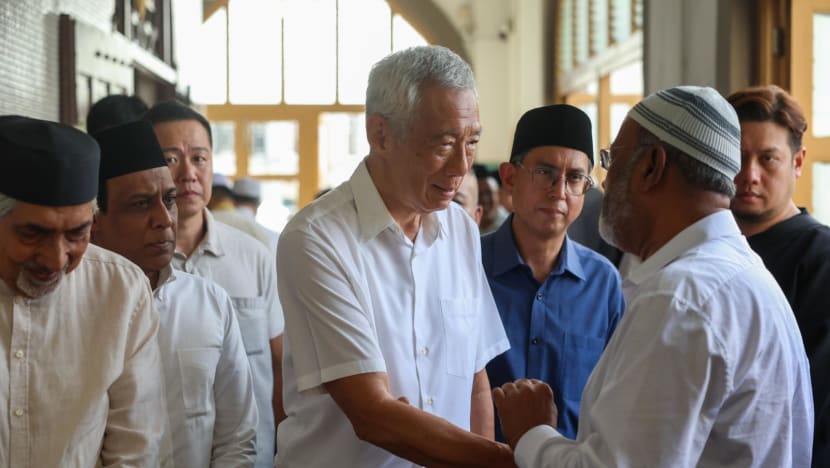Shaikh Syed Isa Semait, Singapore's longest-serving Mufti, dies at 87
Shaikh Syed Isa was a strong advocate for education and a key figure in promoting inter-religious harmony, said the Islamic Religious Council of Singapore.

The Islamic Religious Council of Singapore announced the death of Sheikh Syed Isa Semait, Singapore's longest-serving Mufti, on Jul 7, 2025. (File photo: Islamic Religious Council of Singapore website)

This audio is generated by an AI tool.
SINGAPORE: Singapore’s longest-serving Mufti, Shaikh Syed Isa Semait, died on Monday (Jul 7) at the age of 87.
The Islamic Religious Council of Singapore (MUIS), in a media statement, said that it was "deeply saddened by the passing of a senior religious scholar and leader", adding that his death was a "great loss to the Singapore Muslim community and the nation".
Shaikh Syed Isa was appointed Mufti at 33. He held the position from 1972 to 2010.
As Mufti, he was a strong advocate for education and a key figure in promoting inter-religious harmony. His tenure saw the establishment of many key institutions that had helped propel the religious life of the Muslim community, said MUIS.
This included implementing the system to determine the Islamic calendar, developing the institution of zakat collection and disbursement, social development programmes for the poor and needy and the Mosque Building Fund, which finances the development of mosques in Singapore.
He also supported the formation of the Harmony Centre, located at the An Nahdhah Mosque in Bishan, as a hub to promote interfaith engagement and harmony, as well as the Rahmatan Lil Alamin Foundation, which champions charitable and humanitarian causes.
He also oversaw the establishment of an internationally credible and reliable Halal certification system in Singapore, and the management and growth of the community’s wakaf properties. These are properties that have been permanently dedicated by a Muslim for any purpose recognised by the Muslim law as pious, religious or charitable.
Shaikh Syed Isa also steered the Fatwa Committee in working out solutions for challenging and contentious issues, said MUIS.
He presided over issues such as the Human Organ Transplant Act (HOTA), where he rallied the authorities and the Muslim community to accept a unique solution for Muslims before they fully embraced the HOTA system in 2007, said the council.
He also led efforts to deal with the arrest of the Jemaah Islamiah groups, supporting the establishment of the Religious Rehabilitation group, which rehabilitates the detainees and their families.
A firm believer in education, Shaikh Syed Isa saw seeking knowledge as a religious obligation.
“He recognised the importance of religious teachers continually updating their skills and knowledge to guide the community in a rapidly changing environment,” said MUIS.
His commitment to education led to the establishment of the Syed Isa Semait Scholarship (SISS) in 2015, to honour his vision of cultivating promising talents dedicated to leading and serving Singapore’s religious sector.
Shaikh Syed Isa “was known amongst the interfaith leaders’ circle as playing a significant role in providing leadership and inspiration in enhancing bonds of relationship among the many faith communities for the greater good of Singapore and beyond”, said MUIS.
He was a council member of the Inter-Religious Organisation of Singapore (IRO) in 1975, before becoming a life member. He moved on to become the organisation’s president in 1993.
He was also a member of the Presidential Council for Religious Harmony from 1992 to 2010.
For his exceptional leadership and significant contributions to public service, Shaikh Syed Isa was awarded the Public Administration Medal (Bronze) in 1982 and the Public Administration Medal (Gold) in 2009. He also received the IRO Lifetime Award in recognition of his efforts to strengthen interfaith harmony in Singapore.
In 2011, he was awarded the Meritorious Service Medal.
In its statement, MUIS hailed Shaikh Syed Isa’s wisdom and leadership as “instrumental in shaping a forward-looking and self-confident Muslim community”.
“With his passing, the community has lost a dedicated community leader who worked tirelessly to uplift the community and promote interfaith harmony,” said the council.
Shaikh Syed Isa's unwavering commitment and tireless efforts to promote a confident and progressive Muslim community have left a lasting impact on Singapore and beyond, said MUIS.
“It is our hope that his legacy will continue to inspire future generations of community and religious leaders,” it added.
"TIRELESS CHAMPION FOR SOCIAL HARMONY": PM WONG
Prime Minister Lawrence Wong said on Monday that he was deeply saddened to learn of the death of Shaikh Syed Isa.
Being Singapore's longest-serving Mufti, Shaikh Syed Isa dedicated his life to guiding and uplifting the Muslim community and laid the foundations for many institutions that serve the community today, including the establishment of the Mosque Building Fund and the development of a system for zakat collection and distribution.
"A strong believer in the importance of education, Shaikh Syed Isa recognised the need for religious teachers to contextualise their teachings in our cosmopolitan and multi-religious society. He championed the professional development of our asatizah, the upgrading of our madrasahs, and the strengthening of our system of Islamic education in Singapore," said Mr Wong in a Facebook post.
He added: "As chair of the Fatwa Committee, his leadership was instrumental in guiding the Muslim community through complex and evolving issues.
"He worked closely with the community and the government to arrive at a unique solution to include Singapore Muslims as potential donors under the Human Organ Transplant Act."
Mr Wong also praised Shaikh Syed Isa as "a tireless champion for social harmony in Singapore", adding that he actively promoted inter-faith engagement, and worked to build cohesion and trust among Singaporeans of all races and religions.
"Above all, Shaikh Syed Isa will be remembered for his kindness, wisdom and steadfast dedication to the community," said Mr Wong.
"He was a pillar not just of the Singapore Muslim community but also of our nation. His legacy will live on through the many generations of religious teachers, scholars and Singaporeans whose lives he mentored and touched."

ROLE MODEL FOR ALL SINGAPOREANS: SM LEE
Senior Minister Lee Hsien Loong, who paid his last respects to the former Mufti on Monday, described him as "a great Singaporean" who made lasting contributions to both the Malay-Muslim community and the nation.
Speaking to the media on Monday, Mr Lee recounted meeting Shaikh Syed Isa for the first time in 1988 during a parliamentary select committee hearing on the Group Representation Constituency proposal. As Mufti, Shaikh Syed Isa came before the committee to discuss the proposal in a public hearing.
"It left a deep impression upon us, because he spoke with conviction, he knew the importance of the issue; he knew the sensitivity of the subject. He understood what it took to make Singapore a harmonious society, where the religious minority could be able to live with their own space, and in harmony with the other groups," said Mr Lee.
"The committee asked him many probing questions – pressed him quite hard – but he was calm, he answered with conviction and confidence, and showed that he knew what this was about."
Over the years, Mr Lee said he had met Shaikh Syed Isa on numerous occasions, including on matters concerning race relations, security issues and religious education.
On issues to do with the tudung, organ transplants, new drugs and vaccines, Shaikh Syed Isa "gave very sound, practical, religiously well-grounded advice, which people could have confidence in and would be able to follow", Mr Lee said.
The Senior Minister also expressed regret that he had been unable to meet Shaikh Syed Isa after the latter's retirement.
"I had hoped to be able to catch up with him ... and to thank him for all those many years of contributions once again. But we were not able to fix it, and then COVID-19 came. In the end, we did not manage to do that. Today was my chance to say farewell to him, and to pay my last respects."
"He was a role model and an exemplar to the whole of the Malay community, and in fact, to all Singaporeans," Mr Lee added.
"May his family take pride in what he has done, and comfort in the contributions which he has made to the Malay-Muslim community, and to Singapore."
Mr Lee also wrote a condolence letter addressed to Shaikh Syed Isa's wife, Mdm Sharifah Muznah Mohammad Alhaddad, in which he said Shaikh Syed Isa's leadership "put MUIS at the forefront of Islamic thought and practice in Singapore".
"He advocated for research on and modernisation of religious thought, and sought to upgrade our religious institutions and strengthen Islamic education," said Mr Lee.
"He wanted Muslims in Singapore to rely on sound principles and guidance in responding to new and complex issues, in order to live as faithful Muslims in a harmonious multireligious country. The establishment of the Asatizah Recognition Scheme (ARS) and the upcoming Singapore College of Islamic Studies were built on the strong foundations he laid."
Mr Lee added that Shaikh Syed Isa touched the lives of people of all races and faiths, and made a quiet but important contribution to the racial and religious harmony that Singaporeans enjoy today.
"Singaporeans owe him a debt of gratitude," said Mr Lee.













